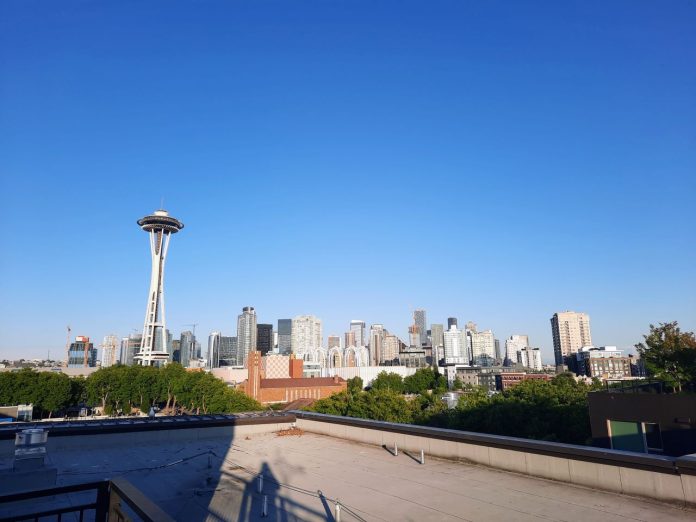
It’s that time of the year. Summer is practically half over and we’re plotting how to squeeze another beach getaway, hiking trip, relaxing staycation, or backyard barbecue into our itineraries. But wait! There’s an important primary election about to happen that demands our attention in-between hammock siestas and sunny summer slacking.
The Urbanist Elections Committee dedicated three gorgeous June afternoons to interviewing about 30 candidates running for local office to find the cream of the crop. The virtual interviews supplemented our questionnaires, which turned up plenty of interesting nuggets in their own right. All-day, candidate-carousel video conferences pushed us to the brink of insanity, but, by George, we learned things and got a little deeper than the consultant-coached candidate veneer. The races we tracked included Seattle City Council, Bellevue City Council, King County Council, and the Seattle Port Commission.
Having sufficiently pushed the candidates to define themselves and their policy vision, we are excited to present to you an urbanist slate of candidates that includes some stellar leaders. These are people worthy of the several minutes it takes away from your summer revelry to fill out the bubbles, seal your envelope, sign and date that sucker, and drop it in the mail or dropbox before 8pm August 1.
Some candidates were lucky enough to run uncontested or face only one challenger, meaning they automatically advance through the top-two primary to the General Election. In this group are some excellent leaders who have won our endorsement but will not be listed here since you don’t have to vote for them in the primary. King County Councilmembers Girmay Zahilay and Claudia Balducci — two of our favorites — are in this bunch, as are Bellevue City Councilmember Janice Zahn and Seattle Port Commissioner Sam Cho.
Other races ended up being logjams, with more candidates than we can recount here. Some races were a tragedy of riches and others felt a bit empty even in their crowdedness. Whether wistfully, enthusiastically, or reluctantly, the important thing is we ultimately arrived at the best leader of the bunch to advance the urbanist cause. Without further ado, here is The Urbanist’s 2023 Primary Slate.
The Urbanist’s 2023 Primary Slate Cheat Sheet
- Seattle City Council District 1 – Maren Costa
- Seattle City Council District 2 – Tammy Morales
- Seattle City Council District 3 – Alex Hudson
- Seattle City Council District 4 – Ron Davis
- Seattle City Council District 5 – Nilu Jenks
- Seattle City Council District 6 – Dan Strauss
- Seattle City Council District 7 – Andrew Lewis
- King County Council District 4 – Becka Johnson Poppe
- King County Council District 8 – Teresa Mosqueda
- Port of Seattle Seat 5 – Fred Felleman
Seattle City Council District 1 – Maren Costa
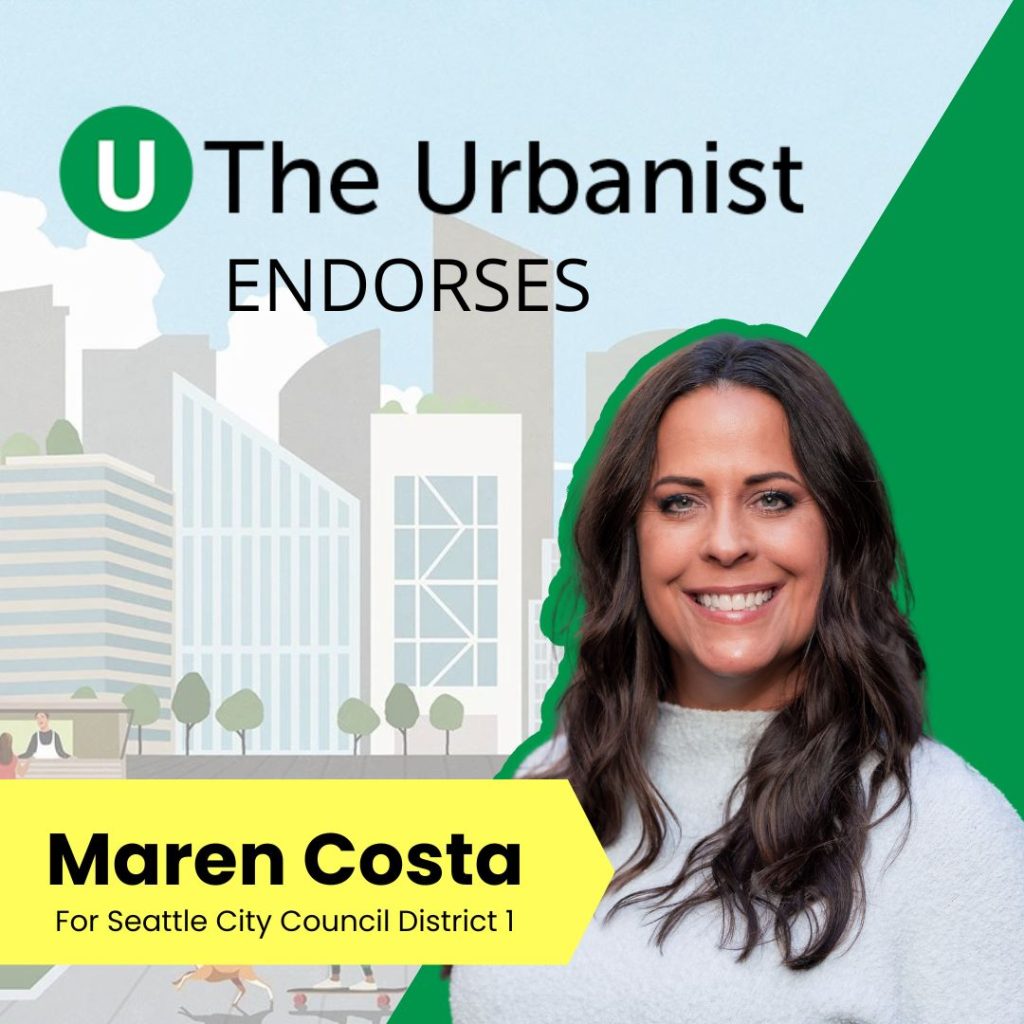
Running with a strong focus on climate justice and workers’ rights, Maren Costa is the candidate that urbanists should support in this race. A former tech worker with solid organizing experience, Costa impressed us with her understanding of how land use, building codes, and transportation policy impact our region’s greenhouse gas emissions. She is the only candidate in this race to explicitly support housing abundance via the Alternative 6 growth option for Seattle’s Comprehensive Plan update, and it was clear from her interview that she understands the urgency of the housing crisis that Seattle and our region are presently facing.
By Costa’s own admission, she is light on specifics when it comes to concrete transportation projects or sources of progressive revenue. However, her values and clear support for equitable climate policy, labor rights, and public transportation provide her with a solid framework through which to evaluate decisions. And on the complex issue of homelessness, she expressed a nuanced perspective underpinned by the conviction (which we share) that sweeps are fundamentally ineffective and counterproductive towards the goal of getting people housed.
Her opponents do not come close to matching her qualifications or vision. Stephen Brown, a Capitol Hill business owner, seems to be a good employer and an involved community member, but lacks political and policymaking experience. Preston Anderson’s experience as a social worker seemed like a promising foundation, but we were disappointed by his support of criminalizing drug possession in spite of insufficient treatment resources. And, perhaps unsurprisingly, we were underwhelmed by Rob Saka’s frequent sports metaphors and lack of coherent policy positions. From his self-proclaimed “all of the above” approach to governance (which would still result in sweeps of unhoused neighbors in spite of inadequate services) to his lack of knowledge of existing municipal policy (like Seattle’s Mandatory Housing Affordability program), his absence of sufficient vision for our city was abundantly clear.
Seattle would benefit from a climate-focused leader who understands just how every issue of urbanist import is related to this defining challenge of our time. Vote Costa.
Questionnaires that were returned in D1:
Seattle City Council District 2 – Tammy Morales
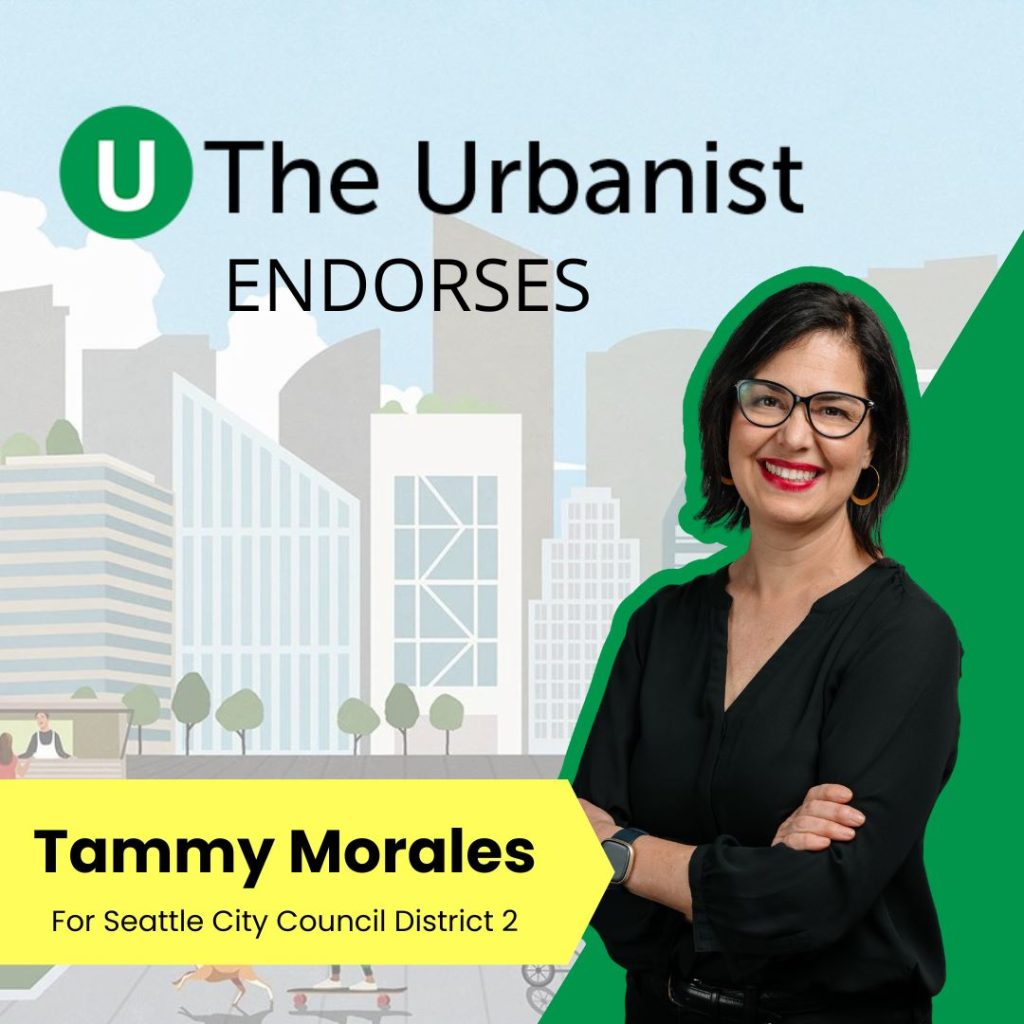
Four years ago, we endorsed Tammy Morales because of her support for investments in transit and affordable housing, commitment to our most vulnerable community members, and progressive vision. We have not been disappointed. Morales has proven herself to be an outstanding councilmember for urbanists. She has been a champion for safe streets and pedestrian safety, was an early supporter of social housing, and has extensively explained her support for Comprehensive Plan Alternative 6 in an op-ed in the Seattle Times.
Her competition, Tanya Woo, is a small business owner and CID Community Watch, nightwatch organizer, who recently organized a protest against a planned shelter expansion adjacent to the CID. In her interview, Woo’s policy positions were either unclear or unpalatable to us – for example, she indicated that she would have voted to support Seattle’s bill criminalizing drug possession, but also that she does not think carceral approaches are an effective approach to substance abuse. On many of the issues that are most important to us, we do not know with certainty where Woo stands. On others, we’re sure where she stands — and we disagree.
Even if Woo wasn’t such a disappointing opponent, we’d stand with Morales. We don’t agree with her on every issue — her unwillingness to use her obvious leadership skills to push for a win-win solution to the CID siting mess was frustrating to us, to say the least — but we’re nonetheless impressed time and time again with her combination of vision, moral clarity, and ability to translate both into policy wins on the ground. Social housing wouldn’t be heading towards implementation without Morales. Safe streets wouldn’t be progressing to the degree they are in South Seattle. And the comp plan would be in far worse hands.
In sum, we think the choice in this race is clear: Vote Morales. Morales has shown us exactly how her progressive values translate into action, and we would be lucky to have four more years. She more than deserves re-election.
Questionnaires that were returned in D2:
Seattle City Council District 3 – Alex Hudson
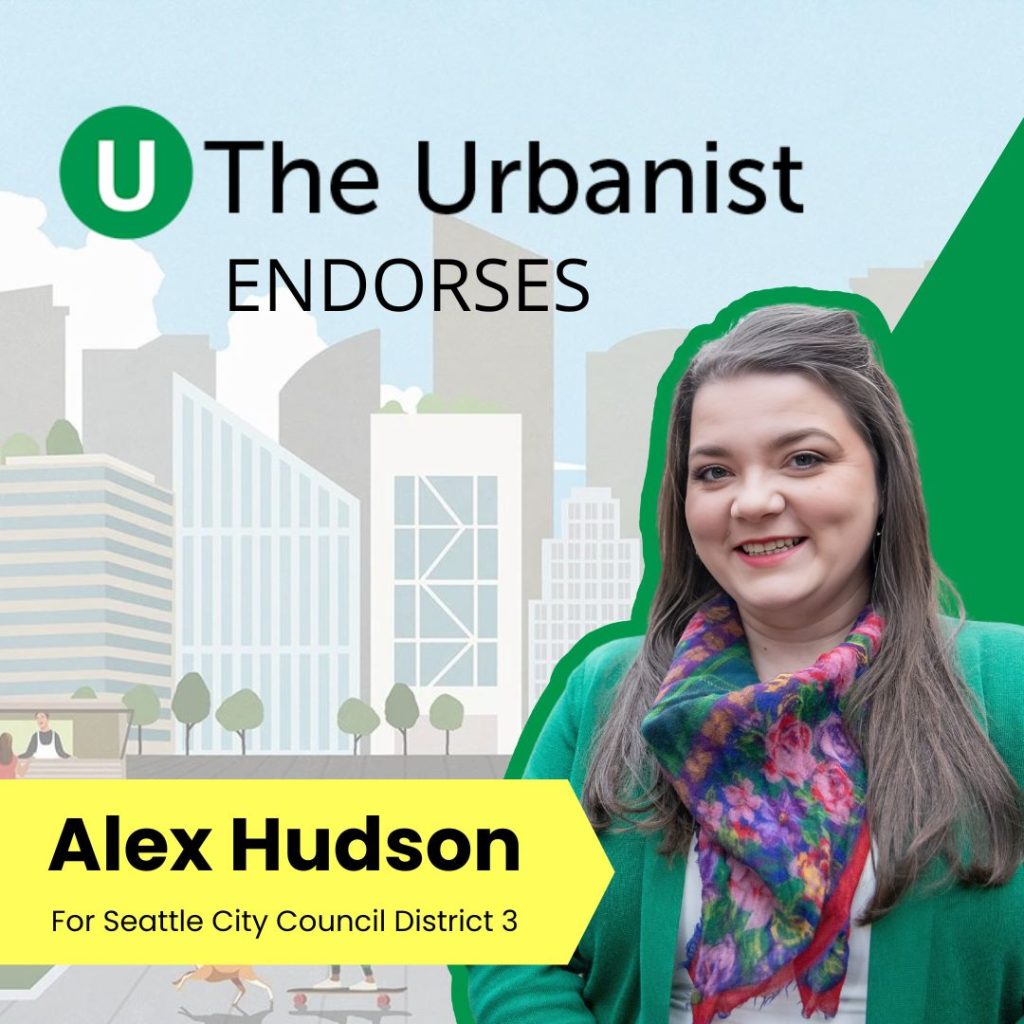
Compared to some other district races we could name (see below), Seattle’s District 3 race has a strong field of contenders to replace lefty firebrand Kshama Sawant. But for us, it wasn’t hard to choose among them by picking the person most likely to be able to deliver on progressive urbanist policies from day one: Alex Hudson.
We’ve been fans of Hudson since her days pushing the agenda of one of the city’s best and yet often overlooked neighborhoods at the First Hill Improvement Association, gathering a coalition of transportation and housing advocates together to push the developer of the Washington State Convention Center expansion to provide $83 million in public benefits for the substantial amount of public space they were set to gain. When you look at the new protected bike lane buffers along 8th Avenue or Pike and Pine Streets or Freeway Park improvements that are on the way, they are the result of Hudson’s efforts.
Since taking the reins as executive director at Transportation Choices Coalition in 2018, Hudson’s track record of being involved in the most important discussions around transportation has continued. From being front-and-center in the negotiations around the last statewide transportation package, which delivered free transit for kids on every transit agency in the entire state, to the push to reform Sound Transit’s punitive fare-enforcement regime, Hudson has shown she can deliver.
After four years of Alex Pedersen as transportation committee chair, we need someone who can come in and reverse the damage. Hudson has been an outspoken critic of recent decisions by the Sound Transit board to study options that deviate wildly from what the voters approved in 2016 with ST3: We can’t think of anyone running in the citywide field who would be a better replacement for Debora Juarez on the Sound Transit board. Given her breadth of experience, it may be hard for King County Executive Dow Constantine to deny her this posting — although there are no guarantees.
The District 3 field is full of candidates with a positive vision for the city that are well-aligned with the direction that The Urbanist elections committee wants to move (we particularly appreciated hearing from Efrain Hudnell, Andrew Ashiofu, and Joy Hollingsworth). But Hudson is the one we trust to get us there. Vote Hudson.
Questionnaires that were returned in D3:
- Alex Hudson
- Andrew Ashiofu
- Efrain Hudnell
- Ry Armstrong
- Joy Hollingsworth
- Alex Cooley
- Bobby Goodwin
- Shobhit Agarwal
Seattle City Council District 4 – Ron Davis
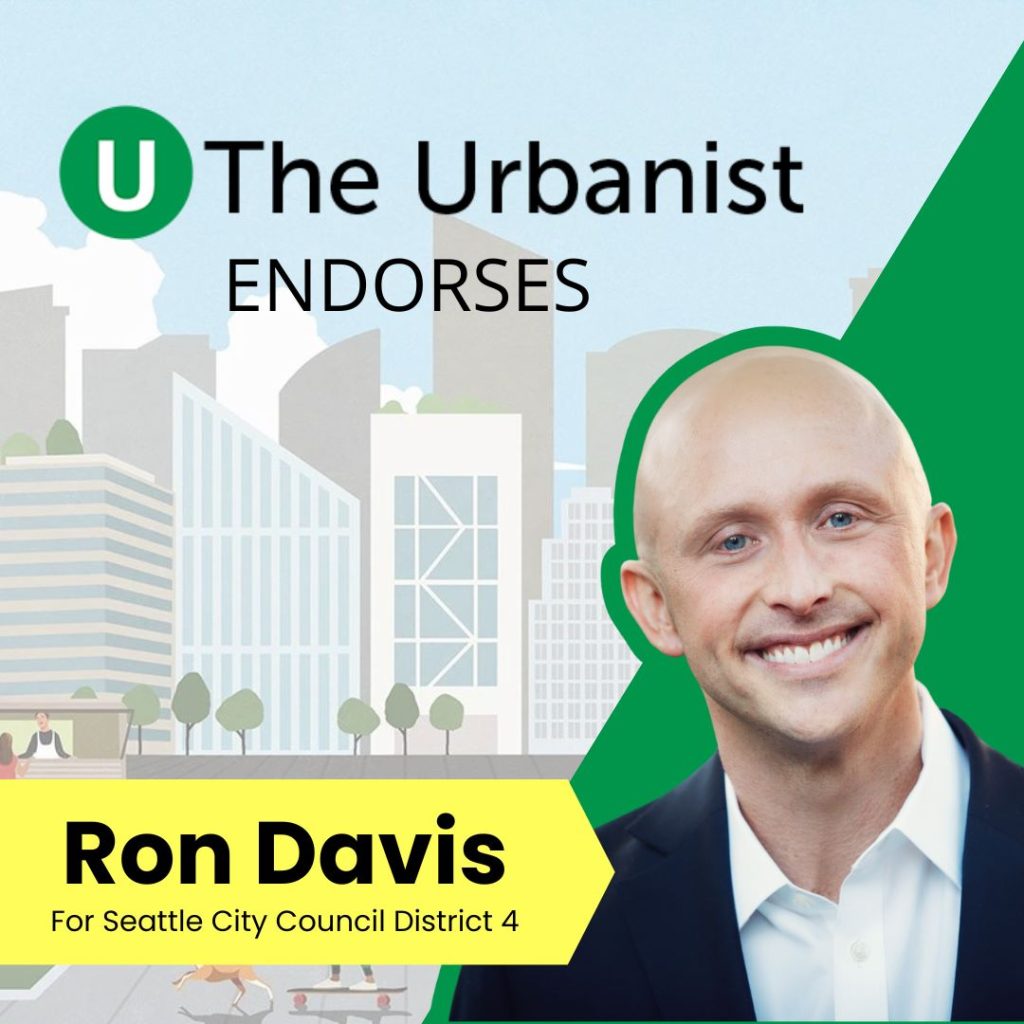
Ron Davis is the clear urbanist choice in D4. He has not shied away from taking a stance in this race, which could have been easy to do in a district that picked up some wealthier, Whiter zip codes in the recent redistricting. More than any other new candidate this cycle we know what Davis is intending to do if voters send him to city hall and it’s music to our ears.
Davis believes in a more walkable, bikeable, transit-rich, and just Seattle with a home for everyone. He will vote to raise progressive revenue to fund affordable housing and social infrastructure that can actually grapple with the scale of the homelessness crisis. He will vote to allow more housing across the city as evidenced by his op-ed in this very periodical arguing for a bolder Alternative 6 to the Seattle Comprehensive Plan. He will vote to dedicate more resources to sidewalks, transit, and bike facilities, and we do not expect him to hide behind process and budget austerity like so many councilmembers have in the past.
This is far more than we can say about his opponents, who have hidden key policy views and failed to articulate visionary plans to meet mobility and housing needs. Kenneth Wilson is running to follow in Alex Pedersen conservative crank footsteps, whereas Maritza Rivera gives us “big talk, little follow-through” vibes. Seattle needs progressive urbanist leadership of the kind Davis can deliver. Vote Davis.
Questionnaires that were returned in D4:
Seattle City Council District 5 – Nilu Jenks
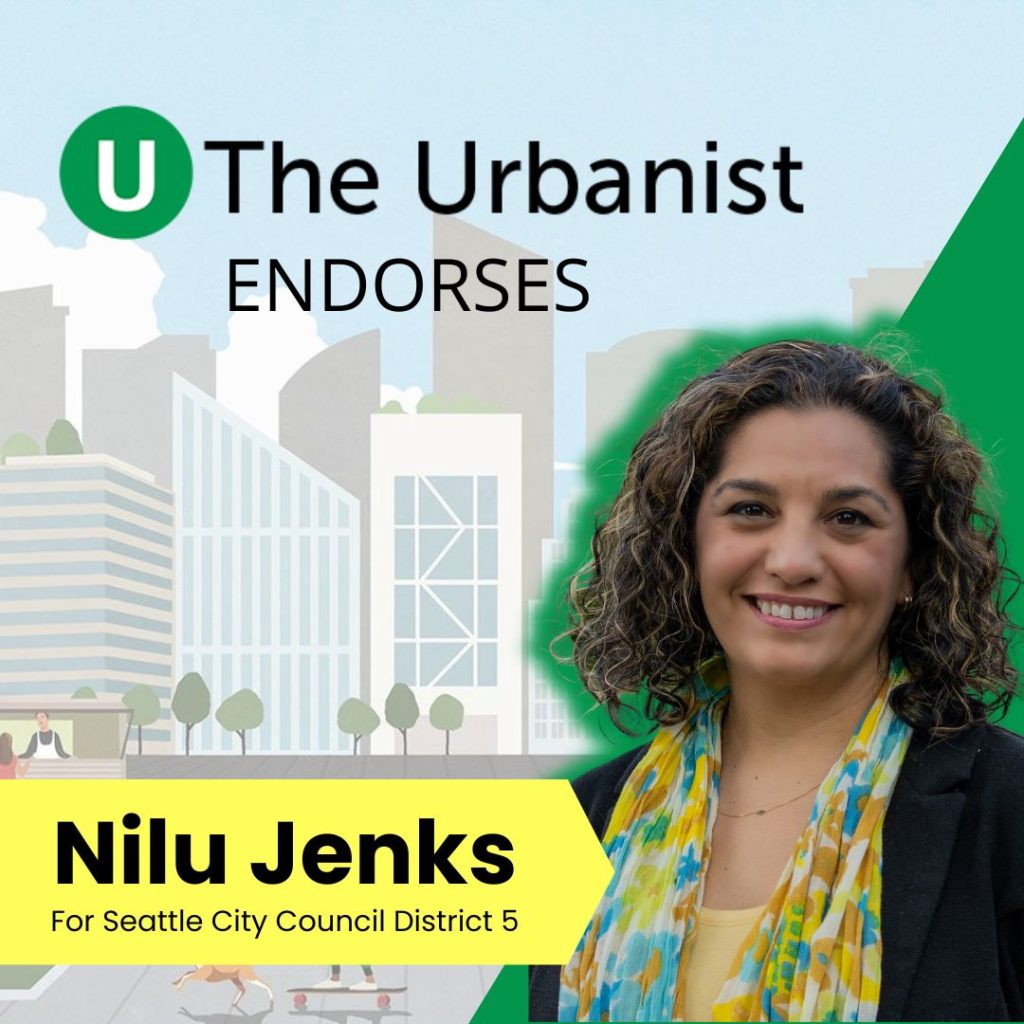
For the last eight years, D5 has been represented at City Hall by Debora Juarez, who has mixed occasional advocacy for urbanist priorities with a frustrating allegiance to the conservative bloc on council and a single-minded hyperfocus on the 130th Street station as City Council’s lone representative to the Sound Transit Board of Directors, even as other projects have been mired in delays and indecision. Juarez declined to run for re-election, which leaves us with an open race for her seat.
We think there are basically two candidates urbanists should consider voting for in this race: Nilu Jenks, who we’re endorsing, and Tye Reed.
Reed, a former member of The Urbanist Elections Committee and a well-known organizer around housing and transportation justice, has demonstrated real chops in community organizing as one of the main forces behind the passage of I-135, the social housing ballot measure which The Urbanist endorsed. Reed also had a less successful turn as the campaign manager for Nicole Thomas-Kennedy’s campaign for City Attorney, which we also endorsed but which failed by just under 4%.
Jenks is less well-known citywide but distinguished herself in our questionnaire by pushing hard for Alternative 6 to the comprehensive plan, identifying several specific sources of progressive revenue she’d advocate for, making clear that she’d have voted against the incarceration-focused drug criminalization bill that recently failed in council, and speaking convincingly about improving bike and pedestrian infrastructure across the city and in D5, which is missing sidewalks in many parts of its northern reaches. Jenks also stood out to us for her clear commitment — driven by a devastating personal experience — to ending gun violence in our city.
Both Reed and Jenks have their liabilities. Jenks flummoxed us by focusing her answer about the next police contract around a desire to create more SPD officers like “Officer Cookie,” a detective who was the face of many a public relations campaign for SPD — and who is also currently suing SPD for discrimination. Answering a question about systemic injustice by cherry-picking an example of a popular individual suggested an assumption of good faith on the part of SPD that we see precious little evidence of.
Reed, meanwhile, failed to convince us that the combative and adversarial style that has served her well as an advocate would translate well to either winning election or achieving progressive outcomes when in office. While this style of politics does mobilize advocates, it often doesn’t persuade.
This was a close call, but we ultimately feel that urbanist voters in D5 would be best-served by voting Jenks in this primary — and by voting for either Jenks or Reed in the general, should only one of the two make it through the primary.
*Election Committee member Maya Ramakrishnan recused herself from deliberations on this race due to a conflict of interest.
Questionnaires that were returned in D5:
Seattle City Council District 6 – Dan Strauss
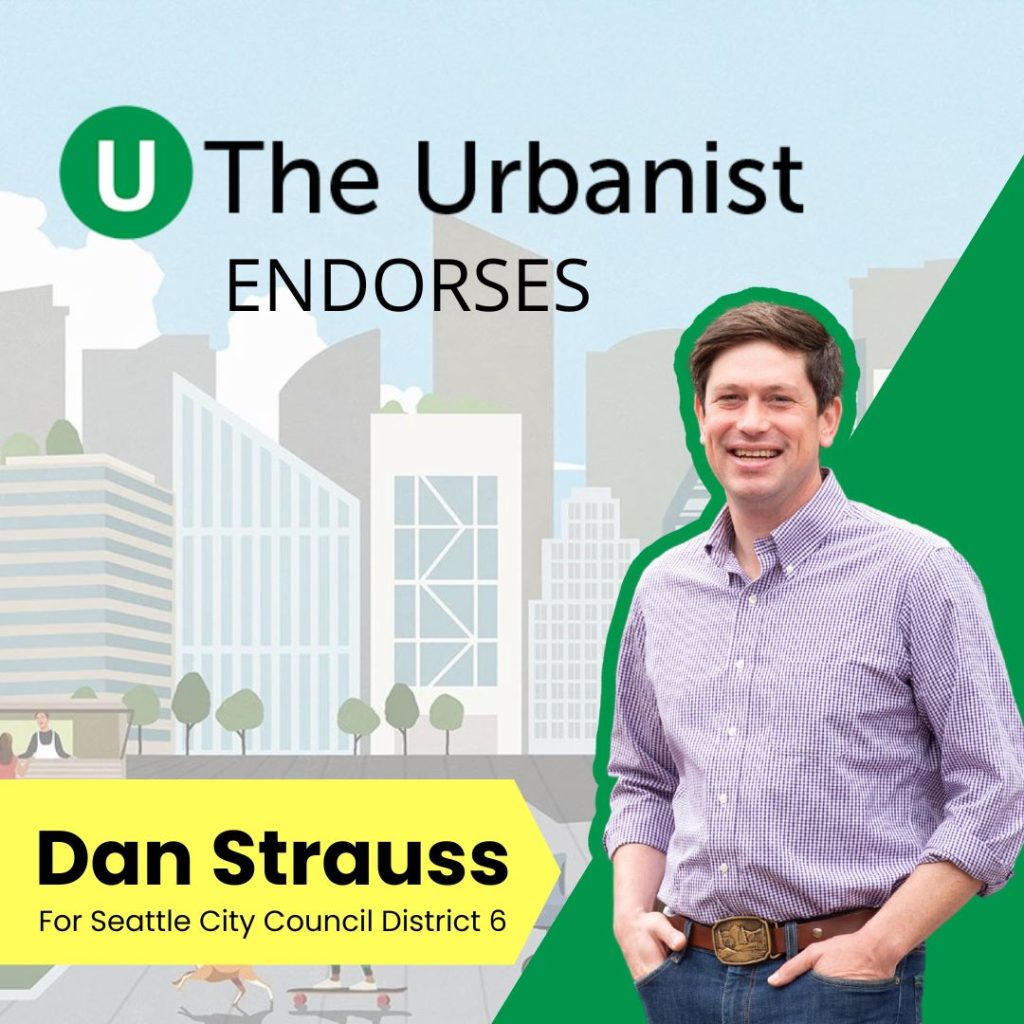
Four years ago, this committee declined to endorse in the primary in District 6 because we were so unimpressed with the state of the field. Four years later, our position hasn’t really changed; there are no strong urbanists in this race. However, this time around, given the Seattle Times’ endorsement of Pete Hanning — a pro-sweeps, anti-tax candidate straight out of the Chamber’s dreams — we need to state for the record that Dan Strauss is clearly the better candidate in this race. You should vote for him. But District 6 deserves better.
Our interview with Strauss was one of the most disappointing interviews we conducted — which is notable, as we interviewed over 30 candidates. He was clearly reading canned responses for much of our conversation and failed to convince us of his commitment to take serious action in response to the concerns of urbanists, inside or outside of his district.
This kind of low-effort approach is particularly frustrating because Strauss is the land use committee chair, a powerful position that he has often squandered due a penchant to drag out proposals in process. City Council sorely needs a strong land use chair as it works to pass a “Major Update” to its Comprehensive Plan by the end of 2024. While we appreciate his dedication to traffic safety and liberalizing street cafe rules, the few changes he has worked to implement have been plodding and relatively minor. The elections committee further vehemently disagreed with Strauss’ vote in favor of giving Republican City Attorney Ann Davison the power to prosecute drug possession, for which he gave no coherent explanation. To us, urbanism doesn’t mean “streateries for the rich and jail for the poor.”
It’s safe to say we’re frustrated by our options in this district. District 6 deserves a champion for a truly expansive and ambitious vision of urbanism. Instead, we’ve got a relatively weak councilmember who seems most motivated by a few pet issues. Again, the choice of how to vote here is clear: Hanning is terrible and all urbanists should vote for Strauss. We’ll therefore end this writeup with a challenge to Councilmember Strauss: Do better. Prove us wrong. Become a champion for your district and ambitious in your vision and we’ll eat our words (and back you enthusiastically!). To our readers from D6, our condolences. Vote Strauss.
Questionnaires that were returned in D6:
Seattle City Council District 7 – Andrew Lewis
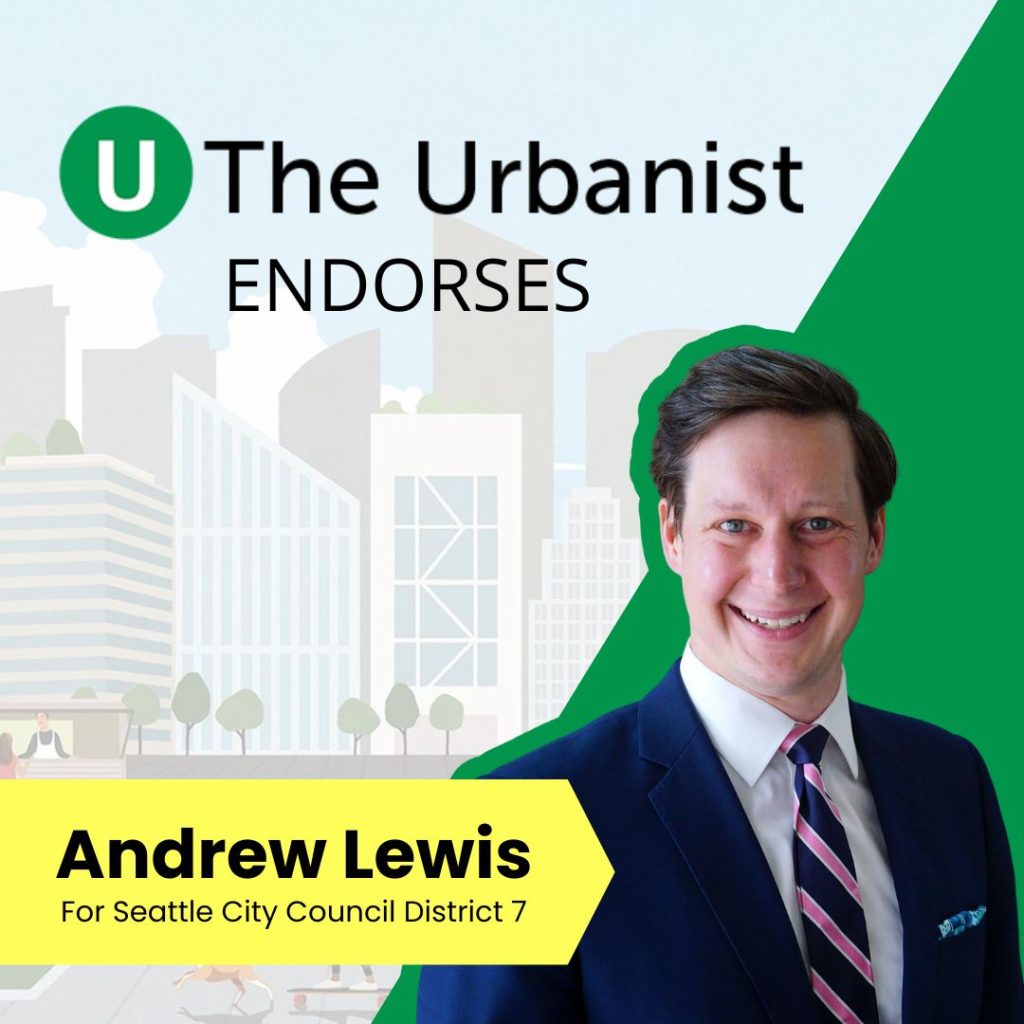
Four years ago you’d have been forgiven for thinking there wasn’t much daylight between Dan Strauss and Andrew Lewis, two young white dudes representing majority white, majority homeowner districts. Four years later, the difference is clear: Strauss has followed, Lewis has led. And in a year in which we’re electing the Council that’ll adopt the 2024 Comprehensive Plan, Lewis’s urbanist vision and willingness to take tough votes will be crucial to our ability to upzone the city, pedestrianize plazas, support social housing, build bike infrastructure, and generally deliver on our goals.
Re-electing Lewis also protects against backsliding on Council. He’s one of two incumbents that voted against giving our extremely punitive city attorney, Ann Davison, the power to prosecute drug possession. We respect Lewis for doing the right thing despite pressure from within his district to do otherwise. He has also shown that he is willing to change his mind in response to the community by voting to amend legislation aimed at protecting renters from late fees. (For those not watching at home, Lewis initially voted in committee for an amendment to the legislation that would raise the cap to the lesser of 1.5% or $50, then listened to smart people that work to keep people housed and realized that the $10 cap was the right way to go. Yay, Lewis.)
Still, even if Lewis hadn’t made some good votes this year, this would be an easy choice. The competition is beyond unserious. Bob Kettle has historically held a public safety role on the Queen Anne Community Council that has not always instilled a commitment to the whole community. It’s unclear who his base is. Aaron Marshall has been flying under the radar by not having any political presence at all, beyond his extremely Google-able Office of Police Accountability record (If you choked on tear gas in 2020 he was probably involved.) Olga Sagan’s base is KOMO and Fox watchers. All would be bad for The Urbanist’s agenda and people that care about this city. Vote Lewis.
Questionnaires that were returned in D7:
King County Council District 4 – Becka Johnson Poppe
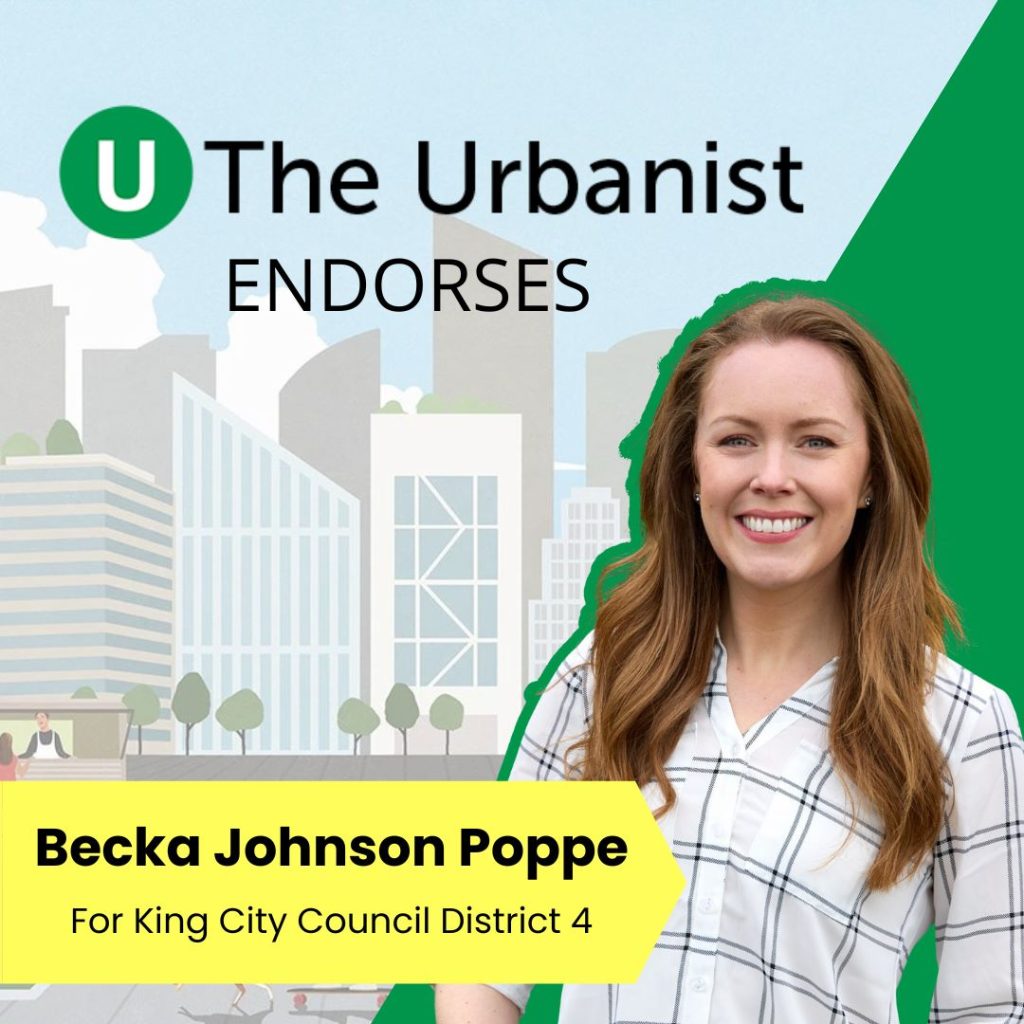
This year’s slate of King County Council D4 candidates may be the race that makes us most wish for Ranked Choice Voting. All three candidates — Becka Johnson Poppe, Jorge Barón, and Sarah Reyneveld – are thoughtful community advocates with superb policy chops. Each of them indicated through their questionnaires and interview answers that they would be excellent King County Councilmembers in different ways. Our first-past-the-post electoral system really doesn’t serve us (ever, but especially in races like these) when voters need to discern between multiple phenomenal candidates. We found last minute entrant, Jorge Barón, to be very impressive and we are excited about all of the different ways he is focusing on progressive revenue, as well as the holistic understanding of county services that he brings as an advocate for immigrant communities.
Ultimately, Johnson Poppe is the person who we believe would most effectively and doggedly champion progressive solutions to our housing affordability crisis, our multimodal transit needs, and our regional public health and safety problems. She earned our endorsement despite the stiff competition because of her proven track record as a progressive leader at the county level in her last ten years as the King County Budget & Policy Manager, her ability to articulate what else needs to be done and her plan for making that happen.
We loved that Johnson Poppe supports a countywide transportation benefit district, and acknowledges the need for a dedicated funding source to support rider priorities such as boosting transit service, increasing workforce compensation, ridership experience improvements, and safety. We also know she could be a huge asset to the Sound Transit Board, which desperately needs her rider- and community-led vision in order to finally deliver on their promises, and we were glad to see she would seek such a board position.
Johnson Poppe would step into the county council seat as someone who already knows the machinery and what levers to pull. Our crises require urgent progressive action, and Johnson Poppe is someone who can act with immediacy. But more importantly, she has great ideas to act on. For voters looking for the most well-prepared, committed, progressive urbanist candidate in this race, there are multiple great choices, and we encourage voting for Becka Johnson Poppe.
*Election Committee member Hannah Sabio-Howell recused herself from deliberations on this race due to a conflict of interest.
Questionnaires that were returned in King County Council D4:
King County Council District 8 – Teresa Mosqueda
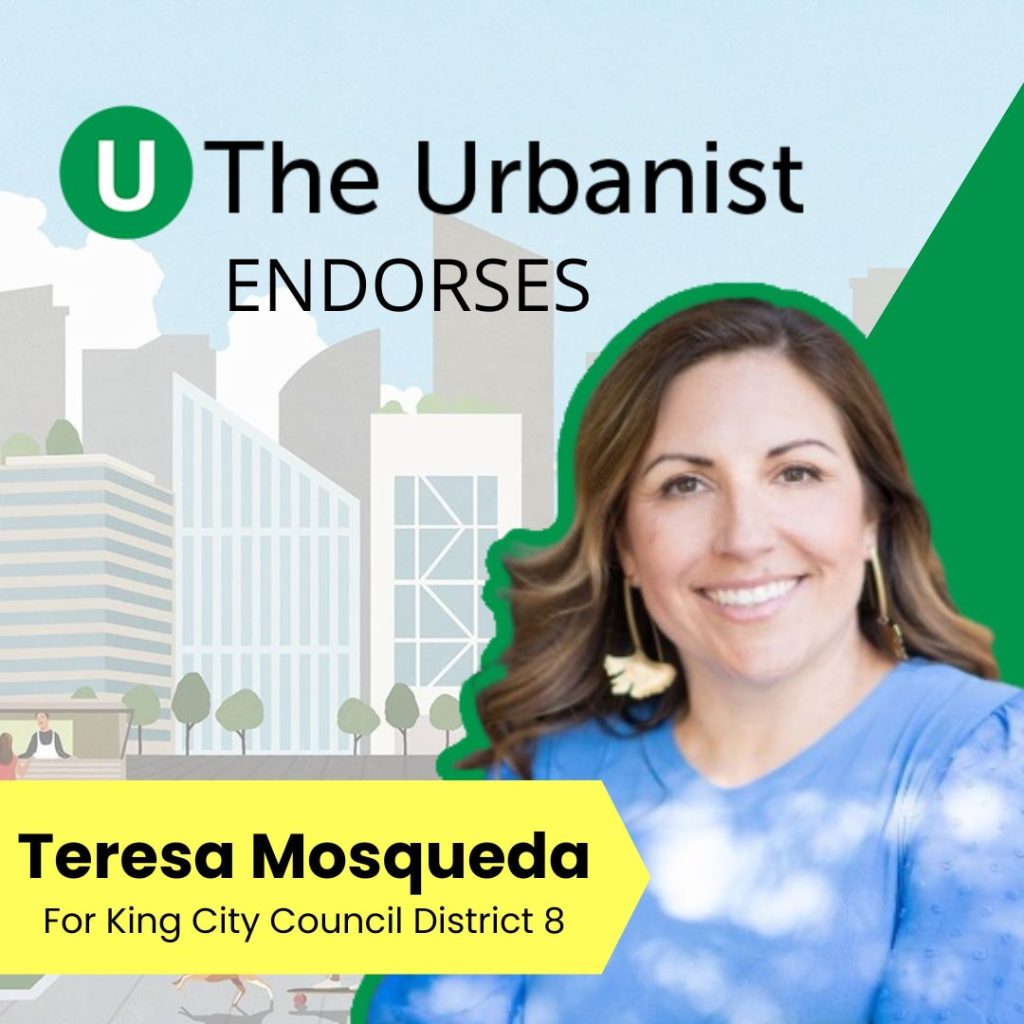
Teresa Mosqueda has proven herself as an incredibly effective leader on the Seattle City Council over the last half-decade, and we expect her to take that same set of skills and dogged tenacity to the King County Council this fall, with our full support.
Few councilmembers can boast of accomplishing more than Mosqueda has in her one-and-a-half terms. In the midst of a pandemic-induced budget crisis, she shepherded the JumpStart Seattle program into fruition, which was probably the largest step Seattle has ever taken toward progressive tax reform. JumpStart will fund affordable housing, Seattle’s Green New Deal, and social service investments for generations to come thanks to Mosqueda’s work — all while reducing the regressive nature of our local tax code. It took careful coalition-building work to craft, pass, and defend the program, and Mosqueda knocked it out of the park at every step, ensuring a durable program.
Mosqueda’s distinguished record goes beyond JumpStart, as she’s also a rock steady vote for zoning reform, housing abundance, worker protections, police accountability, transit improvements, climate action, and increasing traffic safety. She describes transit, housing, child care, and health care “pillars” of her County Council platform. Given her track record at the City, we’d expect more success on those fronts at the County next year.
Mosqueda would support a countywide transportation benefit district in order to get King County Metro back on the path to growth and reliable service. Sadly, such a countywide measure doesn’t currently have the votes on council, but we are optimistic that the incoming crop of leaders, who are more proactive about transit, would put it over the top.
Meanwhile, the main opposition in the race, Burien Mayor Sofia Aragon, is fresh off of taking a performative stand against her homeless neighbors that ended up costing Burien a million dollars in County funding and wiping out most of the Burien planning commission in the process. Any hope of Aragon being a reasonable progressive option has disappeared.
Mosqueda is a rising star in local politics, and she has a proven record of delivering big wins for the working class. Voters would be wise to send her to County Council, where we expect her to continue to grapple with big challenges around housing, transit, child care, and health care, and deftly deliver more big wins. Vote Mosqueda.
Questionnaires that were returned in King County D8:
Port of Seattle Seat 5 – Fred Felleman
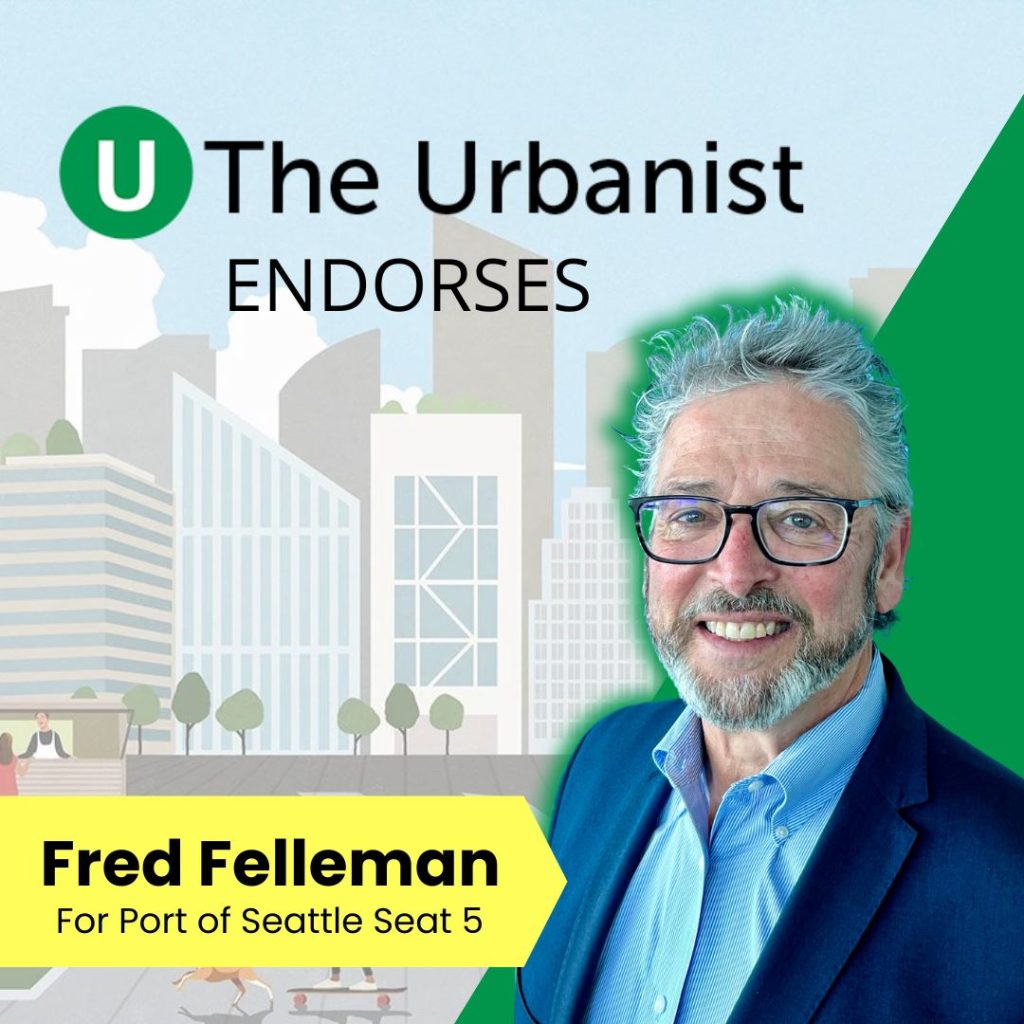
This year, voters don’t really have a robust field of candidates to choose from in the race for two Port of Seattle Commission seats. Current Commission President Sam Cho is running unopposed for his second term. Fred Felleman, running for a third term, has two challengers, Jesse Tam and Todd Curtis, but neither rises to the level of a serious challenger for the Port Commission’s most senior member. Filling in the bubble for Fred Felleman is the best choice voters have this August.
The lack of candidates running for this seat is a bit of a shame: the Port faces some serious issues, including systemic problems around oversight of its massive capital projects, many of which predate even Felleman. Executive Director Steve Metruck and his staff largely run the table at the Port, and while we appreciate Felleman’s acknowledgment of the ways that the current commission structure puts the body at a disadvantage – part-time, low pay – we’re not optimistic that reelecting Felleman will put those issues front-and-center.
We’re happy, though, that Felleman is raising issues that are inhibiting growth in passengers at SeaTac taking transit to the airport, though, ultimately, it’s on the Port to get serious about mode shift, and candidates have been telling us that Airport Way tolling or a broader system of congestion pricing has been on the horizon for nearly a decade. The Port’s recent hardline positions against any new housing capacity in SoDo illustrate the range of issues that the body has its hands in, but voters won’t have much chance to push that policy this year. Until they do, vote Felleman.
Questionnaires that were returned:
Endorsed, but already through the primary
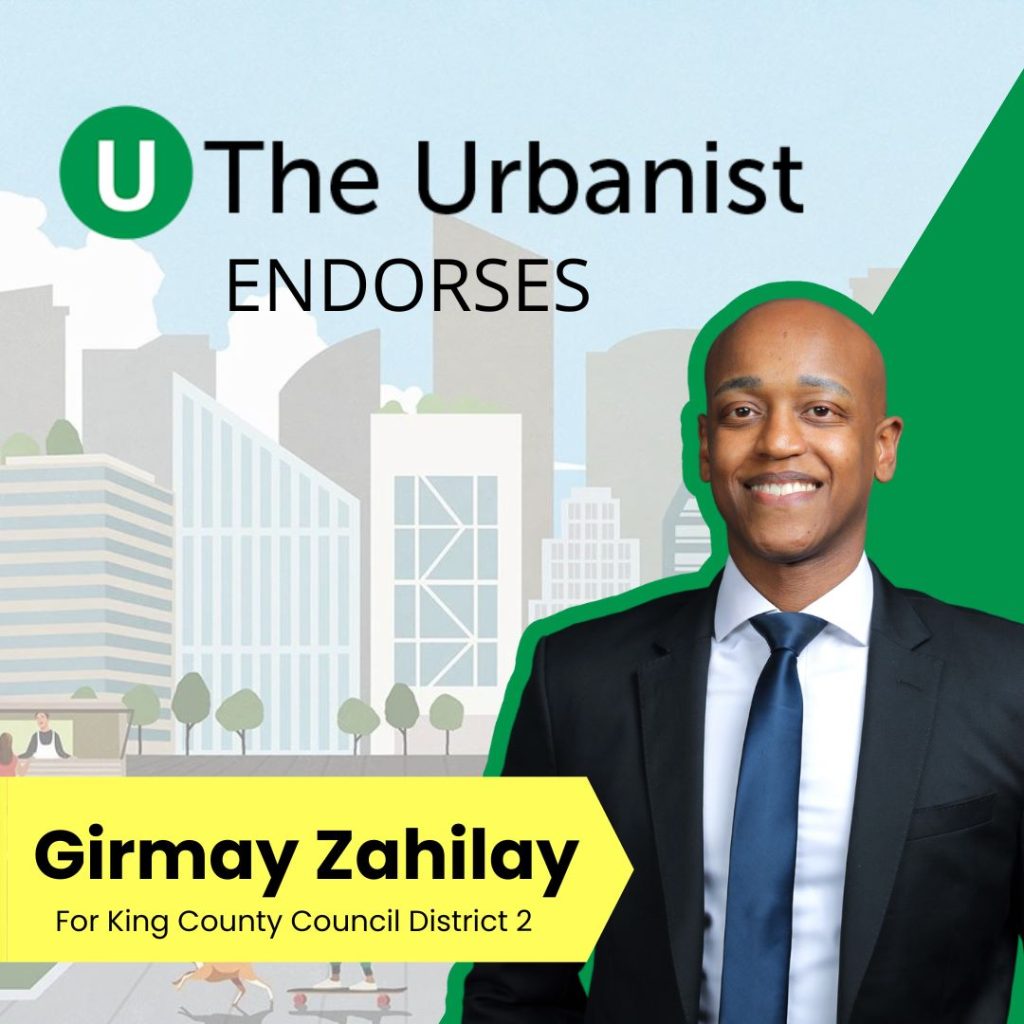
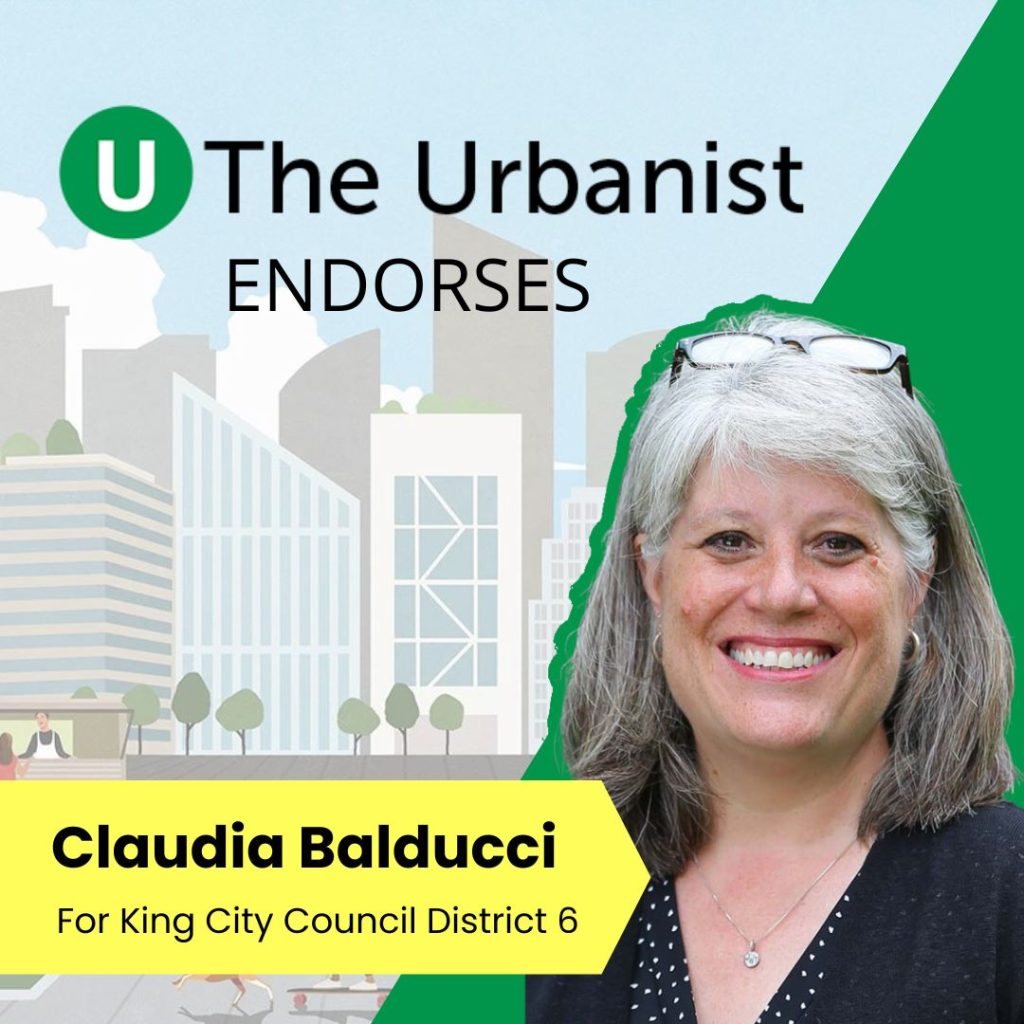
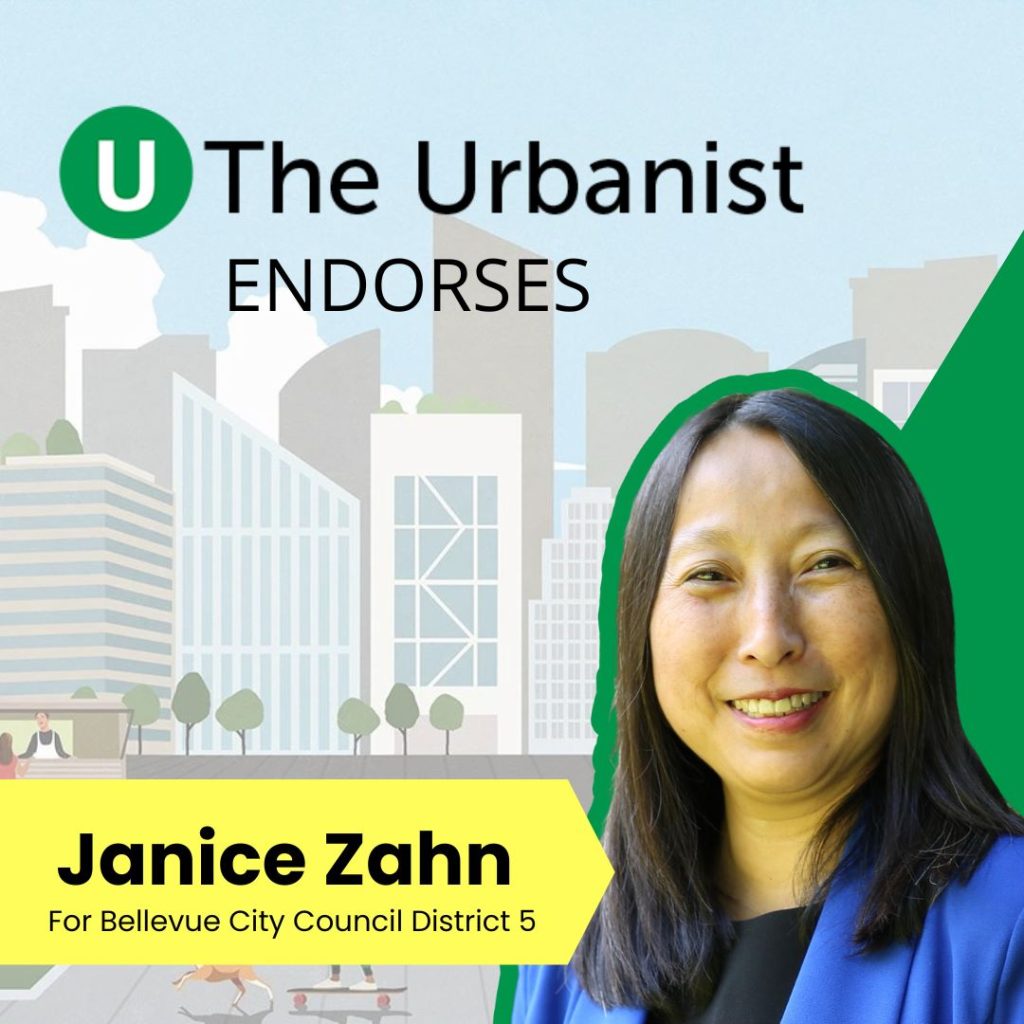
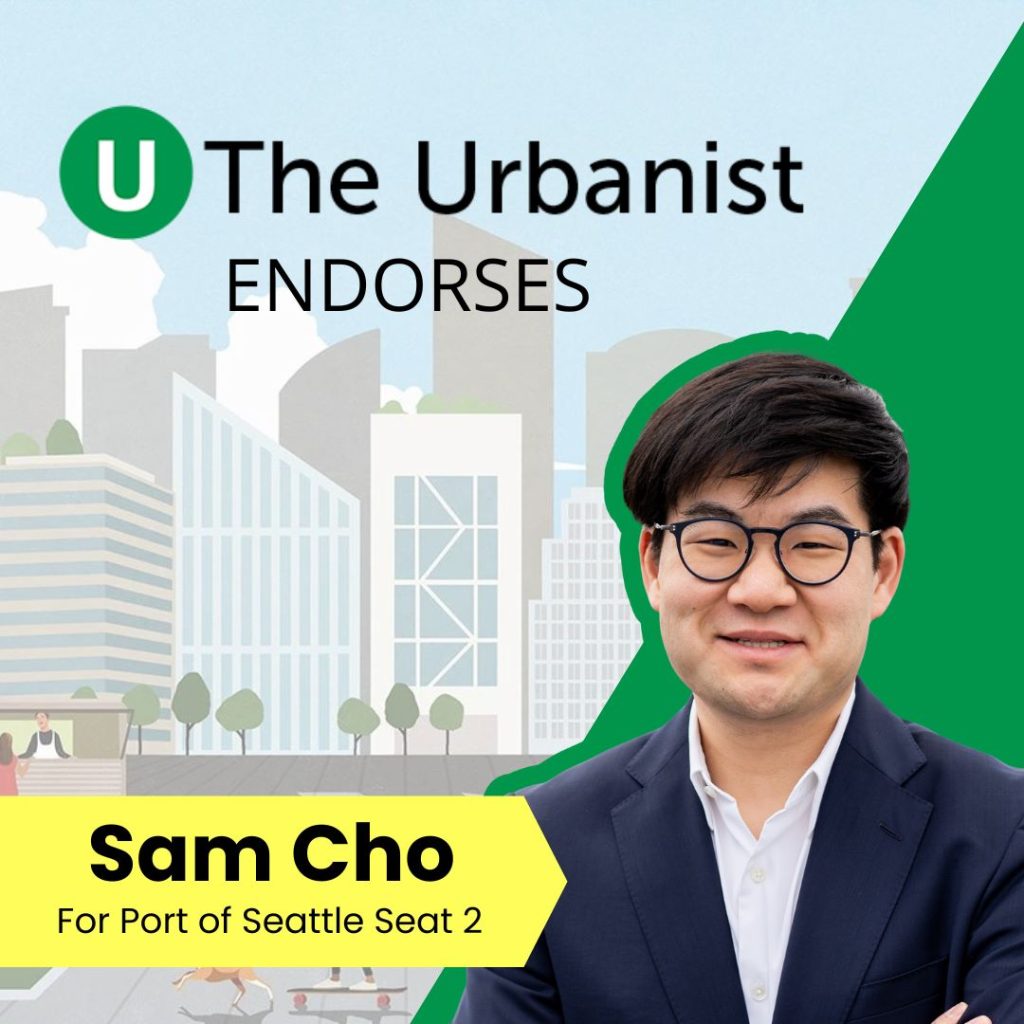
The Urbanist Elections Committee consists of Ryan Packer, Maya Ramakrishnan, Christopher Randels, Hannah Sabio-Howell, Jazmine Smith, Doug Trumm, Rian Watt, and Anita Yandle.

Elections Committee
The Urbanist was founded in 2014 to examine and influence urban policies. We believe cities provide unique opportunities for addressing many of the most challenging social, environmental, and economic problems. We serve as a resource for promoting urbanism, increasing political participation, and improving the places we live. The Elections Committee consists of community volunteers and staff members of The Urbanist and is a standing body representing the political values of our organization.

